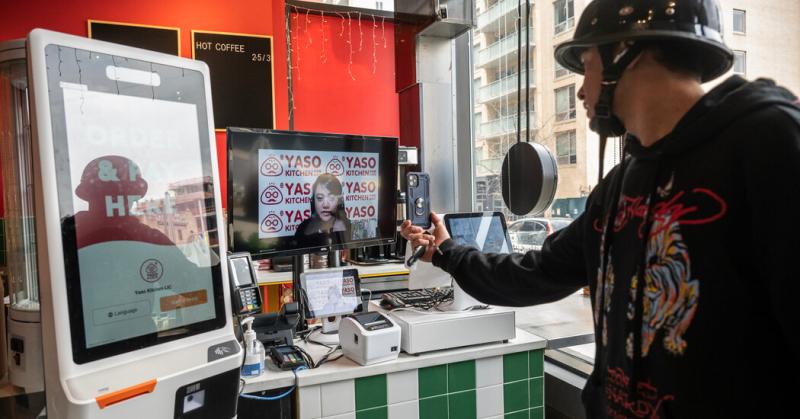Do you buy fruit chicken in New York? The cashier is in the Philippines

A viral tweet showing a virtual cashier from the Philippines working at a New York fast-food restaurant has sparked a debate about the proliferation of cross-border remote work and whether it's a sign of labor market innovation or a dystopian future built around the exploitation of foreign labor.
Tech start-up founder Brett Goldstein posted on X last week about his experience at Japanese fried chicken restaurant Sansan Chicken in the East Village, where he met a Filipino woman working the register from over 8,000 miles away and appearing on a monitor via Zoom.
“It's crazy. The cashier is literally zooming into NYC from the Philippines,” she wrote.
this is insane
cashier is literally zooming into nyc from the philippines pic.twitter.com/opAyS8AYUs
— brett goldstein (@thatguybg) April 6, 2024
Goldstein praised his experience at the restaurant, calling the level of service friendlier "than any in-person cashier in New York."
Even though he placed his order, a $20 chicken katsu curry, through a self-service kiosk, the cashier was waiting and could control the point-of-sale system remotely.
He also had the option of tipping the cashier, he said.
Goldstein's tweet received more than 18 million views and generated a variety of opinions on the use of outsourcing technology in disruptive industries such as F&B. One commenter wrote: “This can't be done.
One commenter wrote: “There is nothing strange if you can pay this virtual worker $5 an hour compared to $20 for a local, and this virtual worker is more grateful for the job and treats the customer with more respect ”.
Goldstein said the company in charge of the virtual cashier service at Sansan Chicken is called Happy Cashier.
While Happy Cashier has no official website and very little information is available online, Chi Zhang, the company's CEO and founder, told Fortune earlier this month that its goal is to "empower small businesses by providing exceptional virtual cash services, as well as operational assistance".
This Week in Asia found job ads seeking “Happy Cashiers” posted in the Philippine sections of Glassdoor and Indeed on April 8. The requirements listed in the ads include rotating night shifts of 20 to 40 hours Monday through Friday, in addition to weekends.
The salary listed in job advertisements is 112 Philippine pesos ($1.98) per hour, with the possibility of earning more through tips and performance bonuses. By way of comparison, the minimum wage in New York is $10.60 for tipped workers, such as waiters, or as high as $18. 112 pesos per hour in the Philippines is not considered particularly high, let's say average for cashiers, but can be increased by tips which are customary in the USA.
Happy Cashier's job ads were posted by Longview Management Group, which describes itself as “a Philippines-based company that hires, pays and manages highly skilled talent for U.S.-based companies.”Innovation or exploitation?
Goldstein's experience highlights a small growing trend among restaurants turning to virtual cashiers as a way to cut costs and address staffing shortages.
In 2023, Canadian start-up Percy launched a system of outsourced virtual cashiers from Pakistan, Bolivia and Nicaragua at locations of healthy fast-casual restaurant Freshii in Toronto, before the service was discontinued in August of that year. According to the Toronto Star, these cashiers earned US$3.75 ($2.76) an hour.
In January, the company expanded its operations to the United States through Nevada-based Mediterranean chain Crazy Pita.
Outsourcing is a major industry in the Philippines, with 1.5 million people employed in the business process outsourcing (BPO) industry, according to the IT and Business Process Association of the Philippines (IBPAP).
The BPO industry is economically vital to the country, with revenue of $32.5 billion in 2023, according to the IBPAP.
Analysts believe that the increasingly rapid adoption of transnational remote working will be a major factor in reshaping the global workforce in the near future. According to the World Economic Forum's 2023 Future of Jobs report, nearly 25% of jobs will be disrupted by 2027 and an estimated 83 million roles will disappear. A workflow without the flow of migrants, but directly from your home.
Dr. Virgel Binghay, a professor at the School of Labor and Industrial Relations at the University of the Philippines, told This Week in Asia that the expected increase in outsourced roles leveraging automation for remote work is driven by factors such as technological advances, economic incentives and evolving workplace standards.
“Developments in communication, automation and cloud computing have made remote collaboration more feasible and convenient, aligning with the global trend of tapping international talent pools to save costs and have 24-hour service capabilities ,” Binghay said.
Although technological changes have allowed workers to seek remote employment around the world, some have criticized this form of outsourcing as exploitative, as it reinforces low wages.
“They don't want to pay a living wage to ordinary American workers, and they don't want immigrant workers. So they turn to exploiting Southeast Asians, whom they can underpay and fire at will,” one X user wrote in response to Goldstein's viral Happy Cashier post.
However, Filipino workers are also at risk: AI could slowly replace these remote workers, but for now a remote working service is provided which could contain the strong inflation linked to services in the USA. For many kids, however, it will be a problem: if you can't even be a cashier in a fast food restaurant, what could your job be?
,

Thanks to our Telegram channel you can stay updated on the publication of new Economic Scenarios articles.
The article Do you buy fruit chicken in New York? The cashier is in the Philippines comes from Economic Scenarios .
This is a machine translation of a post published on Scenari Economici at the URL https://scenarieconomici.it/comprate-il-pollo-frutto-a-new-york-la-cassiera-e-nelle-filippine/ on Thu, 18 Apr 2024 19:25:39 +0000.

